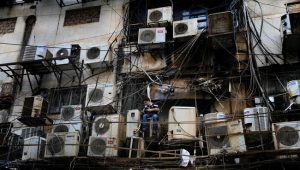The Energy Commission of Nigeria (ECN) and Standard Organisation of Nigeria (SON), in collaboration with the United Nations Environment Programme (UNEP) have reviewed Minimum Energy Performance Standards (MEPS) for air conditioners in Nigeria.

The review, which has the support of Clean Cooling Collaborative (CCC), was done at a technical committee meeting on Wednesday, June 26, 2024, in Abuja.
The inception of this review process was marked by a stakeholders’ workshop on May 15.
The Director-General of ECN, Dr Mustapha Abdullahi, said that the organisations had been working diligently and collectively with the aim of enhancing energy efficiency and promoting climate-friendly cooling solutions.
Abdullahi said this would contribute significantly to Nigeria’s climate goals and sustainable energy access.
According to him, a crucial component of the project is scaling up energy-efficient and climate-friendly cooling in Nigeria’s nationally determined contribution revision.
“These organisations have been diligently working on this project.
“Our collective effort is aimed at enhancing energy efficiency and promoting climate-friendly cooling solutions, thereby contributing significantly to Nigeria’s climate goals and sustainable energy access.
“A crucial component of the project is scaling up energy-efficient and climate-friendly cooling in Nigeria’s nationally determined contribution revision,” he said.
He urged the committee to approach its deliberations with utmost diligence, expertise, and collaborative spirit, adding that it will not only influence national standards but also contribute to Nigeria’s global commitment to combat climate change.
Earlier, the Director-General of SON, Dr Ifeanyi Okeke, said that the review was not just about meeting today’s need but anticipating and preparing for the future to enable Nigeria participates in continental and global trade.
Okeke, represented by Olalekan Omoniyi, Deputy Director, Standards Development, said that setting appropriate standards for energy would contribute to global effort in combating climate change.
According to him, it will also enhance Nigeria’s reputation as a leader in sustainable energy solution potentially attracting more international investment and partnership.
“By setting appropriate standard for energy efficiency, we are not only contributing to global effort to combat climate change.
“It will also enhance Nigeria’s reputation as one of the leading countries in sustainable energy solution, potentially attracting more international investment and partnership,” he said.
The Committee Chairman, Nelson Chukwu, said that one of the objectives of the meeting was to review and scrutinise drafts.
Chukwu said that the committee must pay attention to details and ensure that the standard was robust, scientifically sound and tailored to the scientific needs and conditions of the environment.
He added that the committee was to establish a benchmark to drive the industry to a higher efficiency, while maintaining the balance between performance and cost effectiveness.
“As we deliberate, let us have it at the back of our minds that energy efficiency is not just a technical requirement,” he said.
By Jessica Dogo
